| 
Library
>> Renewable Energy Resource Maps >>
Europe >> Bioenergy >>
Switzerland Bioenergy in Switzerland
Both products
from forestry and agriculture and from waste can be used in Switzerland as an
energy-providing biomass. It can be exploited to render solid, liquid or gaseous
energy sources.
Proportion of forest
in the cantons' surface area 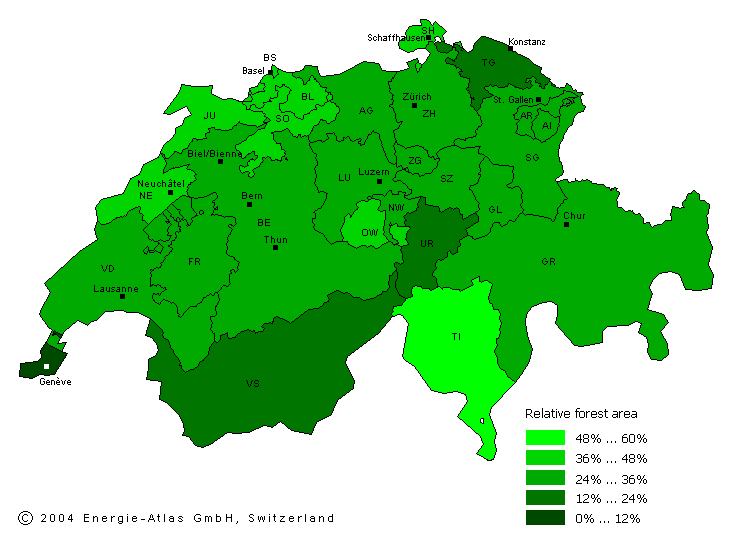
This map shows the proportion of forest as a
percentage of the applicable canton's surface area. Tessin is the canton with
the most forest, followed by the Jura Region and the Canton of Obwalden. Source:
Swiss Federal Statistical Office, Agriculture and Forestry Statistics, as at 2002. Current
total usage of wood per area of forest 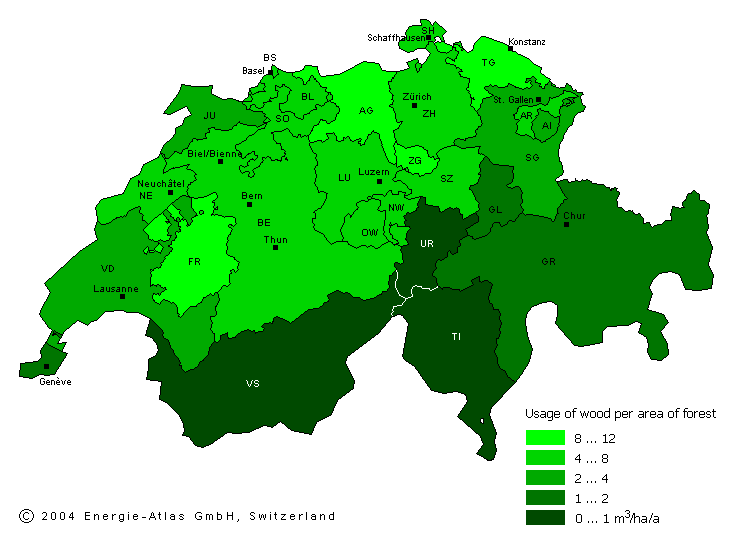
This map shows the forests' current productivity:
The total quantity of trunk, industrial and fire wood is shown that is used in
the forests, expressed as cubic metres of solid wood per year. This value is related
to the area of forest in hectares (1 ha = 10,000 m²). The highest
productivity is shown by the Canton of Zug's forests, followed by Freiburg, Aargau
and Thurgau. The inner-alpine Cantons of Wallis and Uri are less productive, where
the forests are by nature hard to exploit. In the two most forested Cantons of
Tessin and Jura, productivity could still be increased considerably. There and
in many other cantons, it would be possible to extract increased quantities of
firewood. Source: Swiss Federal Statistical Office, Agriculture and Forestry
Statistics, as at 2002. Proportion
of open arable land in the cantons' surface area 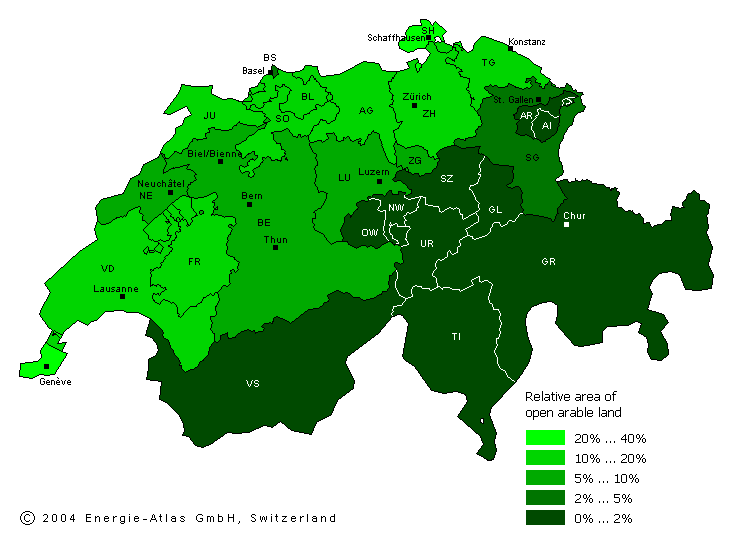
For the production of bio-diesel from Rapeseed
oil Methyl Ester (RME), a sufficient area must be available for growing oil seed
rape. This map shows the proportion of open arable land as a percentage of the
applicable canton's surface area. It follows that arable land is hardly
to be found in the alpine region. The cantons with the most arable land are Schaffhausen
and Geneva, followed by the rest of the Jura Region as far as Lake Constance. Source:
Swiss Federal Statistical Office, Agriculture and Forestry Statistics, as at 2002.
Production potential for Rapeseed oil Methyl Ester
(RME) per head of the population 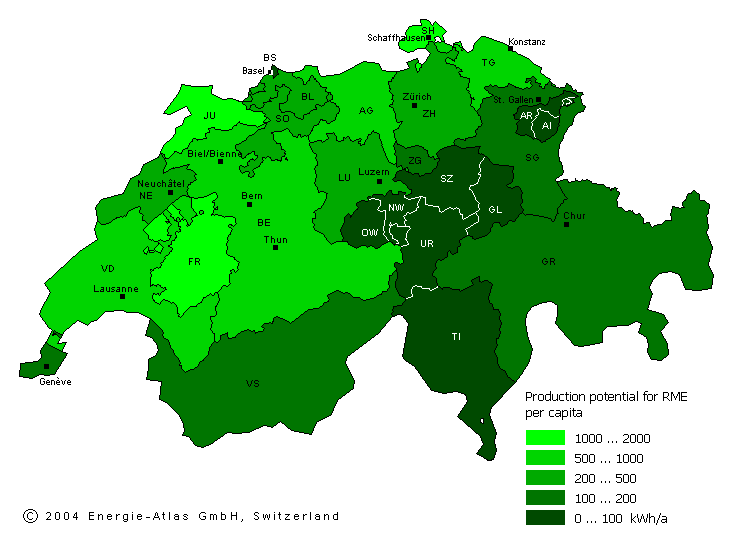
This map shows the theoretical production potential for
RME bio-diesel per head of the population. It was assumed that each year 10% of
the available arable land would be used for the production of oil seed rape. –
To achieve a better comparison, the production figures have been converted into
kilowatt-hours per year. Jura, Schaffhausen and Freiburg stand out as interesting
cantons. Data on which this was based: As for Map 5-CH-201. Additional literature
by H. Hartmann / M. Kaltschmitt "Biomasse als erneuerbarer Energieträger", Fachagentur
Nachwachsende Rohstoffe e.V. , Gülzow / Germany, 2002. Production
potential for agricultural biogas per surface area of the cantons 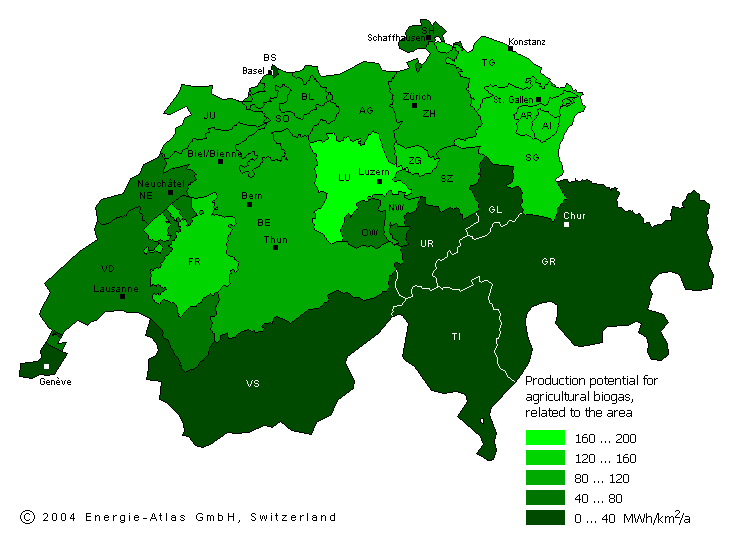
This map shows the theoretical production potential
for biogas from agricultural livestock husbandry. The values are indicated in
megawatt hours per year and related to the surface area of the cantons in square
kilometres. The Canton of Lucerne is clearly predestined for biogas production,
whilst the potential in the inner and southern alpine cantons is very small Data
on which this was based: Swiss Federal Statistical Office, Agriculture and Forestry
Statistics, as at 2002. Additional literature by H. Hartmann / M. Kaltschmitt
"Biomasse als erneuerbarer Energieträger", Fachagentur Nachwachsende Rohstoffe
e.V. , Gülzow / Germany, 2002. http://www.energie-atlas.ch/bi-CH.htm
CountriesAlbania | Andorra | Austria | Belarus | Belgium | Bosnia
Herzigowina | Bulgaria | Croatia | Cyprus | Czech Republic | Denmark | Estonia
| Finland | France | Germany | Greece | Hungary | Iceland | Ireland | Italy |
Latvia | Liechtenstein | Lithuania | Luxembourg | FYR of Macedonia | Malta | FS
of Moldova | Monaco | Netherlands | Norway | Poland
| Portugal | Romania | Russia | San Marino | Serbia & Montenegro | Slovakia
| Slovenia | Spain | Sweden | Switzerland | Ukraine
| United Kingdom | Yugoslavia
Related GENI Resources
Links
AEBIOM (European Biomass
Association)
EUBIA
(European Biomass Industry Association)
EUBIONET
II (European Bioenergy Network)
ERA-NET
Bioenergy | 






